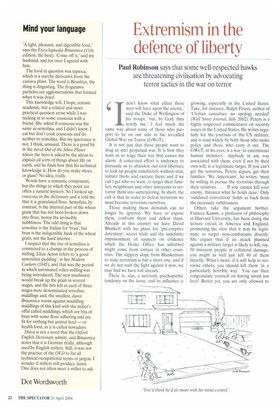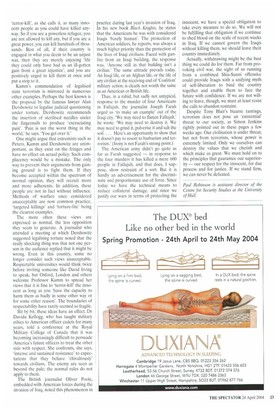Extremism in the defence of liberty
Paul Robinson says that some well-respected hawks are threatening civilisation by advocating terror tactics in the war on terror
1 C don't know what effect these men will have upon the enemy,' said the Duke of Wellington of his troops, 'but, by God, they terrify me.' I feel much the same way about some of those who purport to be on our side in the so-called Global War on Terror (GWoT).
It is not just that these people want to drag us into perpetual war. It is how they want us to wage their war that causes me alarm. A concerted effort is underway to persuade us to abandon our civil liberties; to lock up people indefinitely without trial, torture them, and execute them; and if we can't get who we want, to target their families, neighbours and other innocents to terrorise them into surrendering. In short, the call is that in order to defeat terrorism we must become terrorists ourselves.
Those making these demands can no longer be ignored. We have to expose them, confront them and defeat them. Already in this country we have David Blunkett with his plans for 'pre-emptive detention', secret trials and the indefinite imprisonment of suspects on evidence which the Home Office has admitted might come from torture in other countries. The slippery slope from Blunkettism to state terrorism is but a short one, and if we do not start the fight against it now, we may find we have lost already.
There is, alas, a seriously psychopathic tendency on the loose, and its influence is growing, especially in the United States. Take, for instance, Ralph Peters, author of 'Civilian casualties: no apology needed' (Wall Street Journal, July 2002). Peters is a highly respected commentator on security issues in the United States. He writes regularly for the journals of the US military, and is read widely by both those who make policy and those who carry it out. The GWoT, in his eyes, is a war 'to exterminate human monsters'. Anybody in any way associated with them, even if not by their own will, is a legitimate target. If you can't get the terrorists, Peters argues, get their families. 'We Americans', he writes, 'must be willing to pursue the terrorists through their relatives. . . . If you cannot kill your enemy, threaten what he holds dear.' Only 'outdated convention' holds us back from the necessary ruthlessness.
Others take the argument further. Frances Kamm, a professor of philosophy at Harvard University, has been doing the lecture circuit in America and England, promoting the view that it may be legitimate to target non-combatants directly. She argues that if an attack planned against a military target is likely to kill, say, 50 innocent people in collateral damage, you might as well just kill 40 of them directly. What's more, if it will help to terrorise others, you should kill them 'in a particularly horrible way'. You can then congratulate yourself on having saved ten lives! Better yet, you are only allowed to 'terror-kill', as she calls it, as many innocent people as you could have killed anyway. So if you are a powerless refugee, you are not allowed to kill any, but if you are a great power, you can kill hundreds of thousands. Best of all, if their country is engaged in what you deem to be an unjust war, then they are merely enjoying 'life they could only have had as an ill-gotten gain from a great injustice', and you are positively urged to kill them at once and put a stop to it.
Kamm's commendation of legalised state terrorism is mirrored in numerous other examples. Perhaps the best known is the proposal by the famous lawyer Alan Dershowitz to legalise judicial questioning under torture. Dershowitz recommends the insertion of sterilised needles under the fingernails to produce 'excruciating pain'. 'Pain is not the worst thing in the world,' he says. 'You get over it.'
One might argue that extremists such as Peters. Kamm and Dershowitz are unimportant, as they exist on the fringes and have no effect on actual policy. Such complacency would be a mistake. The only way to prevent their arguments from gaining ground is to fight them. If they become accepted within the spectrum of normal opinion, they will recruit more and more adherents. In addition, these people are not in fact without influence. Methods of warfare once considered unacceptable are now common practice, 'targeted killings' and `torture-lite' being the clearest examples.
The more often these views are expressed as normal, the less opposition they seem to generate. A journalist who attended a meeting at which Dershowitz suggested legalising torture noted that the really shocking thing was that not one person in the audience replied that it might be wrong. Even in this country, some no longer consider such views unacceptable. Respectable universities would think twice before inviting someone like David Irving to speak, but Oxford, London and others welcome Professor Kamm to spread her views that it is fine to 'terror-kill' the innocent as long as you 'have the capacity to harm them as badly in some other way or for some other reason'. The boundaries of respectability have rarely seemed so fragile.
Bit by bit, these ideas have an effect. Dr Davida Kellogg, who has taught military ethics to American officer cadets for many years, told a conference at the Royal Military College of Canada that it was becoming increasingly difficult to persuade America's future officers to treat the other side with respect. She confronts, she says, 'intense and sustained resistance' to expectations that they behave 'chivalrously' towards civilians. The enemy are seen as beyond the pale; the normal rules do not apply to them.
The British journalist Oliver Poole, embedded with American forces during the invasion of Iraq, noted this phenomenon in practice during last year's invasion of Iraq. In his new book Black Knights, he states that the Americans he was with considered Iraqis 'barely human'. The protection of American soldiers, he reports, was always a much higher priority than the protection of the lives of Iraqi civilians. Faced with gunfire from an Iraqi building, the response was, 'Anyone still in that building isn't a civilian.' The same attitude prevails today. An Iraqi life, or an Afghan life, or the life of any civilian at the receiving end of 'Coalition' military action, is clearly not worth the same as an American or British life.
Thus, in a rabid, but sadly not untypical, response to the murder of four Americans in Fallujah, the journalist Joseph Farah urged us to make an example' out of the Iraqi city. 'We may need to flatten Fallujah,' he wrote. 'We may need to destroy it. We may need to grind it, pulverise it and salt the soil.. . . Here's an opportunity to show that it doesn't pay to resort to barbarism and terrorism.' (Irony is not Farah's strong point.) The American army didn't go quite as far as Farah suggested — in response to the four murders it has killed a mere 600 people in Fallujah, and that does, I suppose, show restraint of a sort. But it is hardly an advertisement for the discriminate and proportionate use of force. Since today we have the technical means to reduce collateral damage, and since we justify our wars in terms of protecting the innocent, we have a special obligation to take every measure to do so. We will not be fulfilling that obligation if we continue to shed blood on the scale of recent weeks in Iraq. If we cannot govern the Iraqis without killing them, we should leave their country immediately.
Actually, withdrawing might be the best thing we could do for them. Far from provoking civil war, the sight of us running from a combined Shia-Sunni offensive could provide Iraqis with a unifying myth of self-liberation to bind the country together and enable them to face the future with confidence. If we are not willing to leave, though, we must at least resist the calls to abandon restraint.
Despite Tony Blair's bizarre rantings, terrorism does not pose an 'existential' threat to our society, as Simon Jenkins rightly pointed out in these pages a few weeks ago. Our civilisation is under threat, but not from terrorists, whose power is extremely limited. Only we ourselves can destroy the values that we cherish and which make us great. We must hold on to the principles that guarantee our superiority — our respect for the innocent, for due process and for justice. If we stand firm, we can never be defeated.
Paul Robinson is assistant director of the Centre for Security Studies at the University of Hull.



















































































 Previous page
Previous page